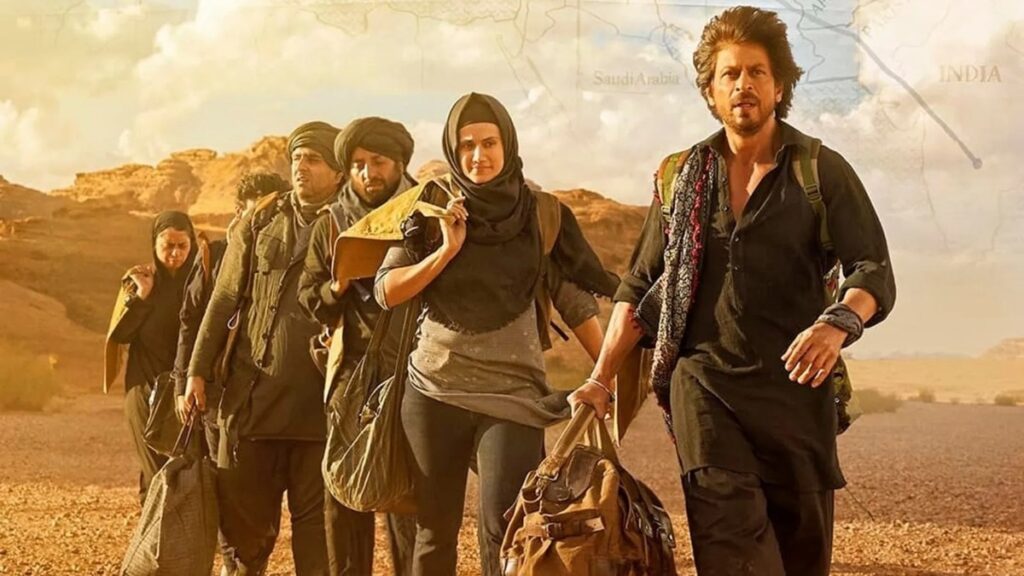Over the past two decades, Rajkumar Hirani has earned both critical and massive commercial acclaim for his films that expertly blend societal issues, humor and poignancy. In his latest project, Dunki, he aims for the same while spotlighting the flaws in immigration laws and their impact on the less fortunate. This time though, the film falls well short of an overall captivating experience and is the filmmaker’s weakest film to date.
Dunki begins in London. Manu Randhawa (Taapsee Pannu), now in her fifties, is hospitalized. Determined to return to her hometown in Laltu, Punjab, she escapes from the hospital and seeks out immigration lawyer Puru Patel (Deven Bhojani) for assistance. But Puru is unable to help her because she had sought asylum in UK from India and so the UK government prohibits her from visiting India. So Manu contacts her friend Hardy Dhillon (Shah Rukh Khan) back in Punjab, urging him to meet her in Dubai. With two other friends, Buggu (Vikram Kochhar) and Balli (Anil Grover), Manu boards a flight bound for Dubai. Twenty-five years earlier, Hardy, an army officer, had visited Laltu to return a tape recorder belonging to Manu’s late brother, who had saved his life. Moved by her family’s financial struggles, he decides to assist Manu and her friends in making a better life for themselves by preparing for the International English Language Testing System (IELTS) exam under the guidance of Geetu Gulati (Boman Irani). Despite all their efforts, they fail to clear the exam, finally prompting Hardy to help them cross the border illegally, locally known as ‘dunki marna’.
Dunki begins promisingly enough to engage the viewer with its world as Manu escapes from the hospital with drip in hand. But as the story unspools, it loses the trademark ‘Hirani touch’ with the disappointingly ordinary scenes written by the Hirani-Abhijat Joshi duo, this time aided by another co-writer, Kanika Dhillon. The progression of Hardy’s love for Manu or sequences like the border crossing, the dramatic church marriage scene or even the bit leading to the interval feel forced rather than true. The film sacrifices every ounce of conviction over narrative sincerity. Even scenes that had potential lump-in-the-throat moments fail to move you. Perhaps this is so as the film lacks depth and merely scratches the surface of its issues. What could have served as a powerful commentary on the complexities of illegal immigration ultimately struggles to leave any sort of lasting impact. Dunki also embeds its narrative with a subtle undercurrent of patriotism as, for example, in the use of the national anthem – Fandry anyone?. The film cleverly uses the love for the country to steer the story towards one of anti-migration. Hardy’s refusal to seek asylum in England stems from his belief that India poses no threat to him, essentially portraying him as someone validating his allegiance to his Indian identity.
There are some points where the film does hit home. Each character is fleshed out well enough and has a compelling reason to seek a better life in England. Manu wants to settle her family’s debt, Buggu wishes to spare his mother from working as a security guard, Balli dreams of a brighter future while Sukhi (Vicky Kaushal) wants to bring home his beloved, who, having been married and in the UK, is suffering marital abuse. However, a big exception among the characterisations is Geetu Gulati, the English teacher, who comes across as little more than a cardboard caricature.
Shah Rukh Khan lifts the film a notch as he breathes life into the altruistic character of Hardy, a man willing to go to any lengths to bring joy to his beloved. His portrayal is infused with charm, energy, and emotion, eliciting our support for his character. Even in his older rendition, he continues to be eminently likeable. Taapsee Pannu effectively embodies a pragmatic character unafraid to sacrifice her love for the sake of her future. Vikram Kochhar, Anil Grover, and Deven Bhojani deliver commendable performances, excelling in both comedic moments and the emotional scenes. On the flip side, Boman Irani’s portrayal of Geetu lacks depth as he is totally defeated by the script and the treatment of his character. Vicky Kaushal’ special appearance reaffirms his status as one of India’s most versatile and solid actors. He effortlessly steals the spotlight in every scene and one can’t help but wish there was more screen time for him in the film.
The three cinematographers, CK Muraleedharan, Manush Nandan and Amit Roy support the film’s narrative suitably. The production design by Subrata Chakraborty and Amit Ray is apt while Bishwadeep Chatterjee’s adept sound design brings forth a seamless integration of the film’s various auditory elements. What adds to this sonic soundscape is the fitting background score by Aman Pant. The music by Pritam is a let down. Except for Lutt Putt Gaya, the remaining songs, despite their musicality, are average at best. Hirani, having edited the film himself, keeps the film moving along though there are times you feel its length.
Overall, Dunki manages to conjure up some on-screen moments that are bound to pull at your heartstrings and even induce a tear or two. The film also contains fleeting glimpses of genuine writing that occasionally pierce through the narrative. But these positives are far too rare and to say that the film falls short is an understatement. Shah Rukh Khan increases the watchability factor, no doubt, but even that is finally not enough.
Hindi, Comedy, Drama, Color


